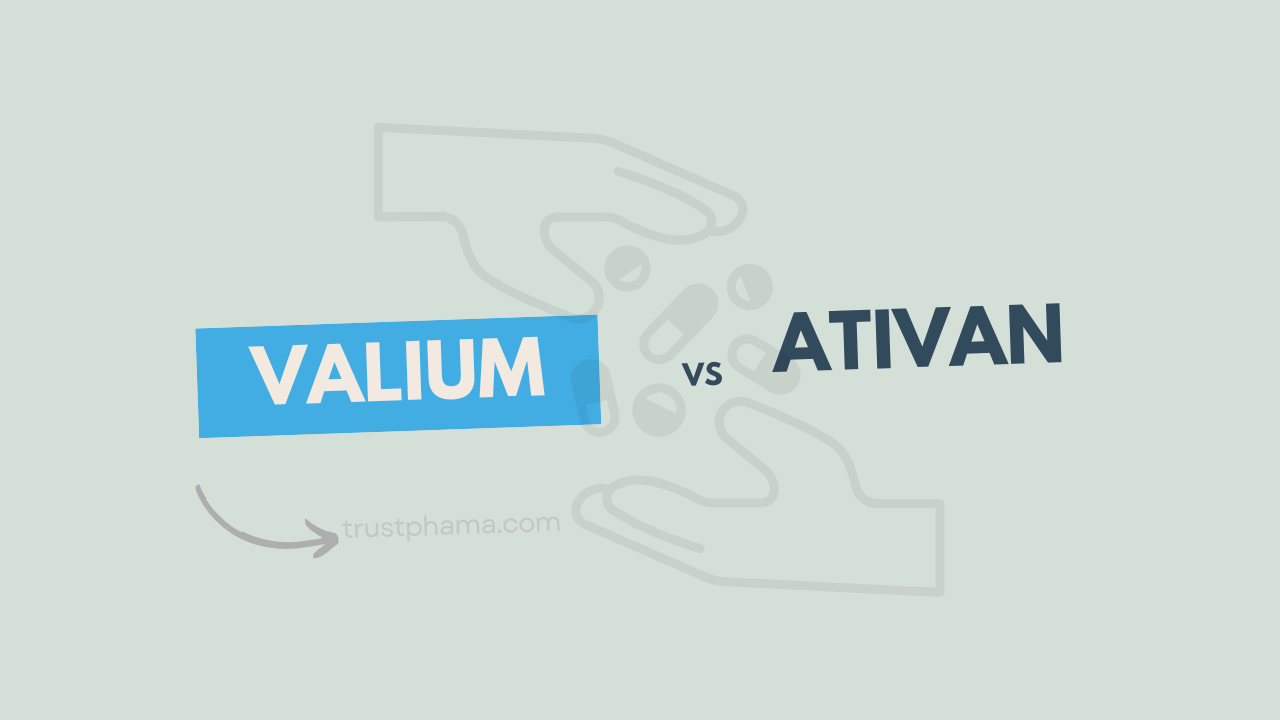Nowadays, Anxiety disorders are the most common mental health condition, affecting millions in worldwide. For many individuals, benzodiazepines like Valium (diazepam) and Ativan (lorazepam) are prescriptions to provide relief from anxiety symptoms. While both medications can be effective, they differ significantly in their properties, uses, and potential side effects. This article offers a detailed comparison of Valium vs Ativan to help you understand which might be the better choice for your needs.
Overview of Benzodiazepines: Valium vs Ativan
Benzodiazepines are a class of medications that enhance the effects of gamma-aminobutyric acid (GABA), a neurotransmitter that inhibits nerve transmission in the brain. This results in a calming effect, making benzodiazepines effective for anxiety, muscle relaxation, and seizure control.
Valium (Diazepam)
Indications
Valium is prescribed for:
- Generalized anxiety disorder (GAD)
- Muscle spasms
- Seizure disorders
- Alcohol withdrawal symptoms
- Sedation before medical procedures
Pharmacokinetics
- Onset of Action: Valium acts relatively quickly, usually within 30 minutes.
- Duration of Action: It has a long half-life, ranging from 20 to 100 hours, which means its effects can last much longer than those of Ativan. This makes Valium suitable for ongoing anxiety management.
- Metabolism: Valium is metabolized in the liver, producing active metabolites that prolong its effects.
Side Effects
Common side effects of Valium may include:
- Drowsiness
- Fatigue
- Dizziness
- Confusion
- Impaired coordination
Because of its longer half-life, users may experience residual sedation, particularly with frequent use.
Ativan (Lorazepam)
Indications
- Generalized anxiety disorder
- Acute anxiety episodes or panic attacks
- Insomnia (short-term)
- Sedation before medical procedures
Pharmacokinetics
- Onset of Action: Ativan generally takes 1 to 2 hours to take effect, which is slightly slower than Valium.
- Duration of Action: It has a shorter half-life of about 10 to 20 hours, making it more appropriate for acute anxiety situations where immediate relief is needed.
- Metabolism: Ativan is also metabolized in the liver but does not produce active metabolites, leading to a more predictable pharmacological profile.
Side Effects
Common side effects of Ativan include:
- Drowsiness
- Dizziness
- Weakness
- Confusion
Due to its shorter duration, Ativan may pose a lower risk of prolonged sedation than Valium.
Efficacy and Use Cases
Valium
Valium is effective for individuals who need long-term anxiety management or have conditions requiring muscle relaxation, such as spasticity. Its long half-life allows for sustained relief from anxiety without needing multiple daily doses. However, this also increases the risk of dependency and tolerance.
Ativan
Ativan is often preferred for situational anxiety due to its rapid onset and shorter duration. It’s particularly useful for individuals who experience panic attacks or require quick relief before stressful events (e.g., public speaking, or medical procedures). However, because it is typically prescribed for short-term use, it may not be suitable for those needing long-term anxiety control.
Risks and Considerations
Both Valium and Ativan come with risks, particularly concerning dependence and withdrawal symptoms. Key considerations include:
- Dependency: Long-term use of benzodiazepines can lead to physical and psychological dependence. Tolerance may also develop, requiring higher dosages to get the same effect.
- Withdrawal: Discontinuation can lead to withdrawal symptoms such as increased anxiety, seizures, and insomnia. A gradual tapering of the medication under medical supervision is recommended to minimize withdrawal effects.
- Interactions: Mixing benzodiazepines with alcohol, opioids, or other CNS depressants can result in severe respiratory depression and sedation, increasing the risk of overdose.
Choosing Between Valium vs Ativan
When deciding between Valium and Ativan, several factors should be taken into account:
- Nature of Anxiety: For chronic anxiety requiring long-term management, Valium may be more appropriate. For acute anxiety episodes, Ativan is often favored.
- Duration of Action: Consider how long you need the effects to last. buy Valium provides longer relief, while Ativan offers more immediate but shorter effects.
- Medical History: A personal or family history of substance use disorder may influence your doctor’s choice. Due to its shorter duration, Ativan might be recommended in such cases.
- Side Effects: Individuals may respond differently to each medication. Monitoring for side effects is essential to ensure the medication aligns with your lifestyle and health needs.
Conclusion
Both Valium and Ativan for anxiety are effective for their management, but their differences in onset, duration, and potential side effects make them suited to different scenarios. It’s crucial to consult with a healthcare provider to determine the best option for your specific circumstances, taking into account your medical history, the nature of your anxiety, and potential risks. Benzodiazepines can be an integral part of anxiety treatment, but they should be used judiciously and as part of a comprehensive treatment plan that may include therapy and lifestyle modifications.
